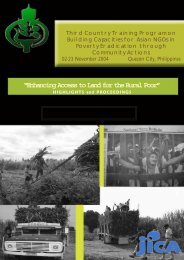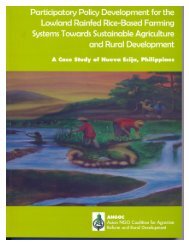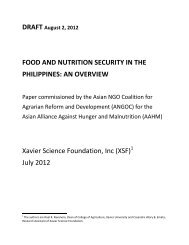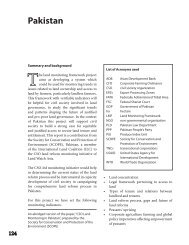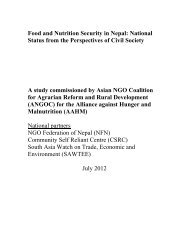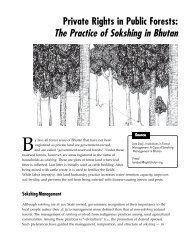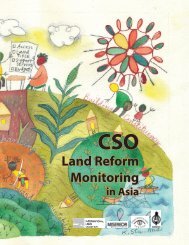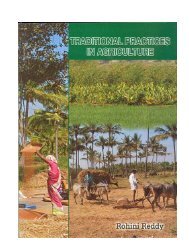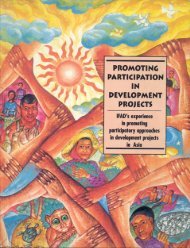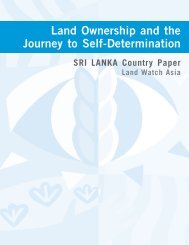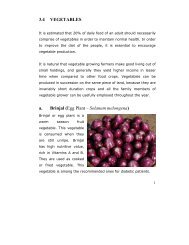Securing the Right to Land FULL - ANGOC
Securing the Right to Land FULL - ANGOC
Securing the Right to Land FULL - ANGOC
Create successful ePaper yourself
Turn your PDF publications into a flip-book with our unique Google optimized e-Paper software.
Little Attention <strong>to</strong> Generation of Knowledge<br />
Research for generating original and relevant information<br />
base is very limited. The knowledge that already exists<br />
is not sufficiently cus<strong>to</strong>mized.<br />
Risks and Challenges<br />
Lack of Political Will<br />
Successive governments in Bangladesh have not prioritized<br />
land reform policies, primarily because government<br />
and political party leaders come from rich, landed families,<br />
which may or may not have had a hand in grabbing stateowned<br />
land and water bodies. But even if <strong>the</strong> leaders may<br />
not <strong>the</strong>mselves have been involved in such activities, <strong>the</strong>y<br />
are reluctant <strong>to</strong> prosecute <strong>the</strong> land-grabbers, who are usually<br />
loyal and generous supporters.<br />
Shrinking Space for <strong>Land</strong> <strong>Right</strong>s Advocacy<br />
Due <strong>to</strong> political instability and <strong>the</strong> “state of emergency”<br />
currently imposed on <strong>the</strong> country, <strong>the</strong> activities of land<br />
rights activists and o<strong>the</strong>r social movements have been seriously<br />
restricted. Changes in government and <strong>the</strong> attendant<br />
changes in policies and programs have also made it difficult<br />
<strong>to</strong> sustain a dialogue with government.<br />
Insufficient Capacity of <strong>Land</strong> <strong>Right</strong>s Organizations and<br />
NGOs<br />
Organizations working on land rights and o<strong>the</strong>r NGOs<br />
are still ill-equipped <strong>to</strong> clearly articulate <strong>the</strong>ir objectives<br />
and strategies, mobilize resources, engage in participa<strong>to</strong>ry<br />
planning, and communicate effectively with government.<br />
This lack of capacity has hindered <strong>the</strong> progress of <strong>the</strong> land<br />
rights movement in <strong>the</strong> country. These groups also have<br />
limited ability <strong>to</strong> analyze <strong>the</strong> issues related <strong>to</strong> land rights,<br />
and have <strong>the</strong>refore failed <strong>to</strong> communicate with o<strong>the</strong>r<br />
stakeholders. Pro-poor land reform advocates must have<br />
<strong>the</strong> ability <strong>to</strong> think strategically and <strong>to</strong> form strong alliances<br />
among o<strong>the</strong>r groups.<br />
Lack of Livelihood Support for <strong>the</strong> <strong>Land</strong>less<br />
One of <strong>the</strong> challenges facing <strong>the</strong> land rights movement<br />
is <strong>the</strong> need <strong>to</strong> provide for and sustain <strong>the</strong> families involved<br />
in <strong>the</strong> movement. The land rights struggle is protracted; at<br />
<strong>the</strong> same time, <strong>the</strong> needs of <strong>the</strong> affected families are immediate.<br />
The challenge <strong>the</strong>refore is how <strong>to</strong> strike a balance<br />
between meeting <strong>the</strong> immediate needs of <strong>the</strong> people and<br />
<strong>the</strong>ir strategic (i.e., long-term) goals.<br />
THE BACKPEDALLING STOPS<br />
53<br />
Unsupportive Donor Policies<br />
Donor policies and priorities sometimes change so<br />
quickly that land rights organizations find <strong>the</strong>ir funding<br />
source drying up all of a sudden. Moreover, many donors<br />
support project based activities following an inflexible<br />
timeframe, which is inappropriate for conducting movements.<br />
The neo-liberal and market-oriented policies adhered<br />
<strong>to</strong> by many donors also work against <strong>the</strong> interests of<br />
tenants and landless farmers.<br />
Strategies for Advancing Access <strong>to</strong> <strong>Land</strong> and<br />
Tenurial Security<br />
Confirmation of Tenurial Security<br />
There is a need <strong>to</strong> confirm <strong>the</strong> tenurial security of land<br />
users. A variety of methods may be used, such as formal<br />
titling programs; formal recognition and registration of cus<strong>to</strong>mary<br />
and o<strong>the</strong>r informal rights <strong>to</strong> land and occupancy;<br />
and tenure registration, which involves updating land<br />
records and clarifying <strong>the</strong> tenurial status of land users and<br />
claimants. Government has tended <strong>to</strong> ignore <strong>the</strong> need <strong>to</strong><br />
confirm <strong>the</strong> tenurial status of land users, or has approached<br />
<strong>the</strong> task by attempting <strong>to</strong> implement comprehensive land<br />
registration and titling programs. The process of tenure formalization<br />
requires careful planning, cus<strong>to</strong>mization and integration<br />
in<strong>to</strong> local contexts.<br />
Redistributive <strong>Land</strong> Reform<br />
Redistributive land reform is relevant in highly unequal<br />
societies and in countries undergoing political and economic<br />
transition, such as Bangladesh. But it tends <strong>to</strong> take<br />
time, linked as it is <strong>to</strong> <strong>the</strong> processes of economic development<br />
and de-colonization. Bangladesh has almost 2 million<br />
hectares of state owned land which it could recover from<br />
<strong>the</strong>ir illegal occupants and redistribute <strong>to</strong> <strong>the</strong> landless poor<br />
in <strong>the</strong> country. The government could also strictly enforce<br />
<strong>the</strong> agricultural land ceiling, expropriate <strong>the</strong> surplus, and<br />
distribute this <strong>to</strong> <strong>the</strong> landless. The government, in partnership<br />
with o<strong>the</strong>r stakeholders, must also provide for basic<br />
infrastructure and social and agricultural support services,<br />
if land reform efforts are <strong>to</strong> succeed.<br />
Improving <strong>the</strong> Capacity of Public Sec<strong>to</strong>r <strong>Land</strong> Institutions<br />
Capacity-building of public sec<strong>to</strong>r land institutions and<br />
<strong>the</strong> use of information technology are essential <strong>to</strong> <strong>the</strong> success<br />
of land registration and titling programs.<br />
ASIAN NGO COALITION FOR AGRARIAN REFORM AND RURAL DEVELOPMENT



